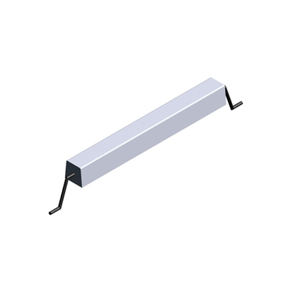Category
MME Aluminium Tank Anodes(14)
MME Zinc Tank Anodes(13)
Price
The use of Sacrifical Anodes in Tanks
General
Traditionally many vessels are fitted with sacrificial anodes for external protection (hull). For achieving the same protection of the internal construction of the vessel (mainly water based tanks) sacrificial anodes can also be used. However due to the fact that tanks are inherently complex structures as well as being confined spaces the use of anodes has to be well engineered and the following rules adhered to.
- Effect of ballast tank anodes
The ballast tank anodeswill be without effect when the ballast tanks are empty. It will take some time to obtain full effect (polarisation) of submerged steel surfaces after filling with seawater. In the under deck area on top of tanks the anodes will not be effective unless the tanks are completely filled. - The use of zinc / aluminium or magnesium anodes
Anode alloy materials based on zinc or aluminium are acceptable, magnesium alloy is not allowed. Ballast tanks adjacent to tanks for liquid cargo with a flash point <60° are to be considered as dangerous areas. Aluminium alloy anodes are to be located in such a way the kinetic energy which is developed in case of loosening and falling down will be <275 J. This means that in these areas the maximum height (in mtr) of an aluminium anode above tank bottom, deck or stringer may not exceed the value obtained by “28 / W”, where “W” is the gross weight of the anode. Futhermore classification society may require structures to be installed to protect the aluminium anodes from being hit by falling objects. Please consult your local surveyor / classification society branch office for full details. - Welding or bolting type anodes
For a good operation of the anodes it is vital to have a good electrical continuity between the ship structure and the anodes. This can be obtained either by welding (preferably) or bolting the anodes to the ship structure. In case bolting type anodes are requested the optional ‘M’ clamps can be used.

